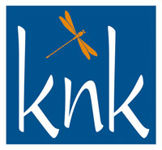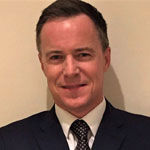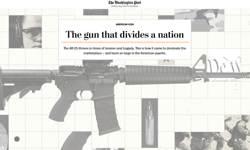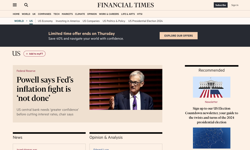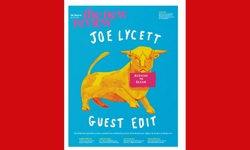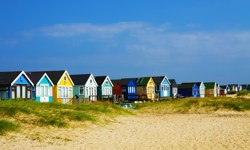Perhaps falling revenues across the media industry resulted in more budget belt-tightening; or maybe the prospect of a trip across the Irish Sea was just too daunting.
But whatever the reason, there was a dishearteningly low number of serving editors at the Society of Editors (SoE) annual conference in Belfast in November 2012.
The SoE’s official ‘attending’ list gave a healthy enough total of 194 delegates, but only 40 of these, around 20%, were current editors of national, regional or local news organisations in the UK.
Just two were national newspaper editors – Chris Blackhurst of the Independent and Stefano Hatfield of the paper’s compact i edition. That’s two out of at least 30 national daily and Sunday papers across the UK.
In fairness, as the SoE was keen to stress, several national papers sent senior colleagues as representatives, and there was a plethora of ‘managing’, ‘executive’ or ‘associate’-style editors on the list. But no actual editors of the Sun, Daily Mirror, Daily Mail, the Guardian, Financial Times, the Times, the Daily Telegraph et al, nor any editors of their Sunday stable mates, were present.
At first glance, the numbers read better for the UK’s regional and local newspaper industry, from which as many as 29 editors made the journey. But when you put that number into the context of more than 1,100 regional and local daily and weekly newspapers across the UK, it really was a dismal attendance.
Around half of those making up the 29 were editors of papers owned by independent and family firms, with the ‘big four’ regional publishers – Northcliffe, Trinity Mirror, Johnston and Newsquest – struggling to send enough to make up a Rugby Union team between them. One delegate reported that he’d heard that the word had gone out at Northcliffe not to attend – and indeed, only a single Northcliffe editor was present.
In addition to the above, there were six editor-level news chiefs from the broadcast world – four from the BBC and two from Sky, but none from ITN or independent radio.
Making up the numbers to 40 were the editors of the online Huffington Post UK and the Methodist Reporter, along with Jonathan Grun, editor of the respected Press Association news agency and, for the second time, the SoE’s new president for the next 12 months.
None of these statistics is meant to criticise the conference, which debated several subjects of prime interest for today’s media world with an impressive list of speakers. But for many editors who did attend, the lack of contemporaries was noticed and much-criticised.
When I put my analysis of delegate numbers to Bob Satchwell, the SoE’s executive director, he underlined the fact that several national editors were represented by senior editorial executives, but accepted that the ‘serving editor’ attendance was low.
Bob told me: “2012 was an exceptional year for the media, and the conference coming so close to the Leveson Report made it very difficult for senior national editors to get there themselves.”
But what about the lack of regional editors, and the fact that delegates who were not editors made up nearly 80% of those who attended?
“We would always welcome more people to the conference,” said Bob, “and we do offer some special deals for regional editors in this economic climate. It is an important annual dialogue when editors get an opportunity to exchange ideas and simply think about their jobs away from the day-to-day pressures.
“But we also recognise that those pressures make it difficult for them to get away. That’s why we try to brief members with video and online reporting from the conference.”
Bob added: “I am confident that the delegates reflected the views of the industry, and that we canvass views not only of conference delegates but, through regional briefings and email surveys, of editors everywhere in all parts of the media.
“The people who were there were editors or senior editorial executives along with people such as media lawyers who are very close to the decision-making of all editors.”
The McAlpine factor
If any delegate needed reminding how close the Society of Editors is to the trials facing journalism, the ‘Additional Information’ note explaining last minute conference changes did the job.
During the weekend that conference began, the media world was going crazy over the flawed BBC Newsnight programme that led to the defamation of Lord Alistair McAlpine, resulting in the resignation of director general George Entwistle.
This meant that the official host of the conference, Francesca Unsworth, the BBC’s head of newsgathering and the SoE’s outgoing president, had to leave Belfast before it began to “return to London to supervise her team covering the story”.
This was understood by everyone, especially when the BBC announced on the Monday that Francesca had been appointed acting head of news.
The ‘Additional Information’ note revealed another absence: “Iain Overton, editor of the Bureau of Investigative Journalism, is unavailable to attend and sends his apologies.”
It was Iain, of course, who had made the original allegation on Twitter earlier in November that the Newsnight programme – put together by his Bureau – was about to unmask a paedophile.
As is now well known, Overton’s tweet and the shameful name-game that ensued on Twitter meant the innocent Lord McAlpine was wrongly accused of sex abuse on the internet, with catastrophic results for BBC bosses.
Ironically, Iain was supposed to have appeared at a conference session discussing the future of investigative journalism, but by 11am on Monday, his eventual resignation explained his absence.
Instead of disappointing delegates, these changes provided a buzz to conversations at the Belfast City Hall drinks reception on Sunday night: the SoE was in the eye of a storm, and where better to be than at conference?
The world after Leveson
The show then began on Monday with ‘The world after Leveson’, a debate on the forthcoming inquiry. This session has now, of course, been overtaken by the release of and resulting melee surrounding the Leveson Report, but a few of the comments made are still worth recording.
Peter Preston, former editor of the Guardian, said that the way politicians were lining up to make editorial judgements on Newsnight showed how they could “constantly interfere” if state regulation was introduced for newspapers: “It’s very dangerous to let politicians into this area at all.”
Philippa Kennedy, ombudsman of the Sun, said: “They [referring to celebrities like Hugh Grant] don’t understand that most journalists, most of the time, try to get things right,” while media lawyer David Price QC opined: “Irresponsibility is an integral part of press freedom.”
Adapt or die
On Monday afternoon, the best session was ‘Adapt or die. Whatever next?’, a panel supposedly discussing everything from hyper-local websites to micro TV, although it was still traditional newsprint that excited delegates.
Stefano Hatfield, editor of the i, rationalised its success: “Our strongest days are when we splash on what everyone else splashes on. We deliberately don’t seek to have the quirky splash. This is something different. Unashamedly serious. Unashamedly the same as what’s in the Independent – just subbed down to be shorter, 64 pages for 20p.”
And as for profitability, Stefano was thought-provoking: “The Independent still loses money, but it loses less money [now that] i makes a positive contribution.”
Investigative journalism
The main session on Tuesday 13 November was the above-mentioned panel that Iain Overton pulled out of: ‘Keeping the investigative end up’.
The headline-grabber here was Brian Flynn, investigations editor at the Sun, who assured delegates that no investigation commences at Murdoch’s favourite tabloid without it “fully complying with the law, the PCC’s Code of Conduct and News International’s own policies”.
Brian described how the Sun’s work was not all celebrity gossip, highlighting a recent exposé of a former Nazi policeman who’d sent 15,700 to die in World War Two. But he did argue that the Sun’s popularity due to celebrity coverage helps to fund such investigations.
And he warned that the cost in time and legal costs mean that the media’s choice to undertake investigations might end up being based not on the public interest of a story, but on the increasing burden of standing up for it afterwards.
Brian added: “Investigative journalism can be a murky business. We all know that the MPs’ expenses scandal was the result of paying for stolen documents… [But] if the state is given the power to oversee or limit our work, it could bring about a new ice age and kill off what we all entered journalism to do.”
This fear was echoed by Mark Watts, editor-in-chief of investigative website Exaro, who told how Newsnight had a ‘bang’ versus ‘hassle’ rule for investigations: “How big an impact is this going to make, and how much time am I going to have to spend clearing it up afterwards.”
This, he ventured, might go some way to explaining why Newsnight decided not to run the initial Jimmy Savile story.
All delegates nodded at Brian’s insightful conclusion: “We all know what investigative journalism is – it’s bloody good, old fashioned journalism, it involves checks, going out to see for yourself rather than relying on someone else’s word for it. That’s why it’s expensive and that’s why we have to fight for it.”
With that, the SoE conference closed and delegates returned home to watch how Leveson’s Inquiry might change the traditional world of journalism.
And as InPublishing went to press, they were still watching as the industry tried to cobble together a ‘last chance saloon’ system of self-regulation in a bid to convince the government not to introduce media legislation.

